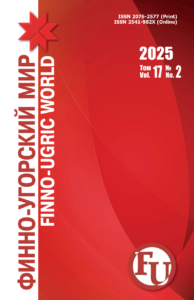Mosina Natalia M.,
Cand. Sc. (Philology), Docent of the Chair of Finno-Ugric and Comparative Linguistics, Mordovia N. P. Ogarev State University (Saransk, RF), natamish@rambler.ru
Kaksin Andrei D.,
Cand. Sc. (Philology), the Head of Khanty Obsk-Ugric Philology Institute of Applied Research and Development (Khanty-Mansiysk, RF), adkaksin@yandex.ru
Davydova Leonora V.,
the Head of Foreign Books Delivery Desk of Komi Republic National Library, Honored Worker of Culture of Komi Republic (Syktyvkar, RF), ino@nbrkomi.ru
Latkina Lyudmila I.,
Chief Librarian of Foreign Languages Literature Department of Komi Republic National Library (Syktyvkar, RF), ino@nbrkomi.ru
Konshin Anatoly E.,
Doctor of History, Professor of the Chair of Legal and Social Disciplines and Humanities, the Director of Udmurt State University Branch in Kudymkar (Kudymkar, RF), rabota02007@yandex.ru
Bahlova Olga V.,
Doctor of Political Science, Professor of the Chair of General History and Global Political Process, Mordovia N. P. Ogarev State University (Saransk, RF), bahlov@mail.ru
Golyshenkova Elena V.,
an Art Historian, a Member of Russia Union of Artists (Saransk, RF), +7 8342 476233
Shkalina Galina E.,
Doctor of Cultural Studies, Professor, the Head of Culture and Arts Department of Mari State University (Yoshkar Ola, RF), galina_shkalina@mail.ru
Safonkina Olga S.,
Cand. Sc. (Philosophy), a Senior Lecturer of the Chair of Foreign Languages for Science and Engineering, Mordovia N. P. Ogarev State University (Saransk, RF), okuznetchik@yandex.ru
Bazhenova Anna A.,
Editor of the Data Gathering Center «Finnougoriya» of Russian Finno-Ugric Cultural Center (Syktyvkar, RF), fucult@rambler.ru
Krisanova Natalia A.,
Cand. Sc. (History), Docent of the Chair of Pedagogics, Mordovia N. P. Ogarev State University (Saransk, RF), krinatal@mail.ru
Nikitina Galina A.,
Doctor of History, Professor, Deputy Director for Science of Udmurt Institute of History, Language and Literature, Ural Division of Russian Academy of Science (Izhevsk, RF), nikitina@ni.udm.ru
Hakkarainen Tarmo,
the Coordinator of the Project of the M. A. Castrén Society (Helsinki, Finland), etunimi.sukunimi@castren.inet.fi






















